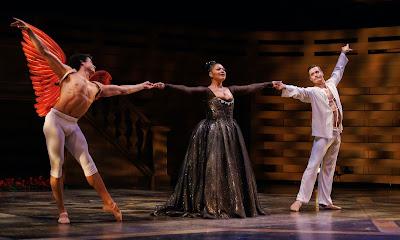Reviewed by James Karas
Shaniqua in Abstraction is a new play written and performed
by bahia watson. It is a solo performance and watson deserves huge credit for a
bravura performance. Shaniqua is a woman of mixed race with blond hair and dreadlocks.
watson takes on half a dozen or more personalities from a modern woman to a nineteenth
century slave, to a young mother and microphone-in-hand performer. She adopts
different accents, does dance steps and acts with ferocious energy when
necessary and more quietly when need be. The performance lasts about 75 minutes
without intermission.
What
the play is about is more difficult to describe. “In abstraction” of the title may
indicate that this is not a straight narrative about Shaniqua. There is much
said about black and mixed-race women in an impressionistic way so that we get numerous vignettes but rarely a concrete
picture. Watson deals with the relations between black men and white women,
black men and black women and white men with black women.
Like
a chameleon, watson takes us through the time periods indicated above and the
different personalities but being an abstract or an impressionistic portrait there
is no coherent narrative. It often sounded like a stream-of-consciousness recitation
of memories, or expressions of thoughts that went through Shaniqua’s mind that
she shared with us.
The
production is done in the small Studio Theatre and there is liberal use of lighting
effects and projected videos including some news reports about black women. Warson
wears an orange exercise outfit and portrays the many facets of Shaniqua's life
or the lives of black and mixed-colour women but the details provided are too
numerous, quick and opaque for me to retain more than an impression of what I
was watching.
The
set by Echo Zhou consists of a chair and a bench with the rear of the stage used for projections of shimmering lights, videos of news reports
and some titles designed by Kimberly Purteil.
watson’s
performance is worth seeing, otherwise be prepared for impressionistic,
abstract, stream-of-consciousness theatre.
______________________________
Shaniqua in
Abstraction by bahia watson. a Crow’s Theatre production in
association with paul watson productions and Obsidian Theatre Company,
continues until April 28, 2024, in the
Studio Theatre of Streetcar/Crowsnest Theatre, 345 Carlaw Avenue, Toronto,
Ontario. http://crowstheatre.com/






